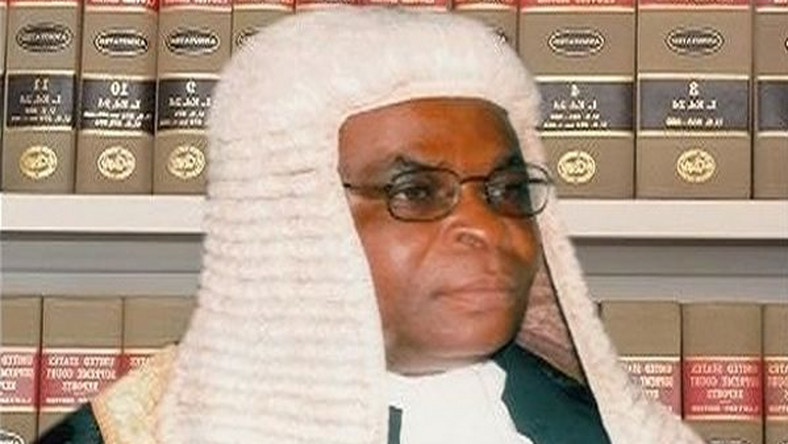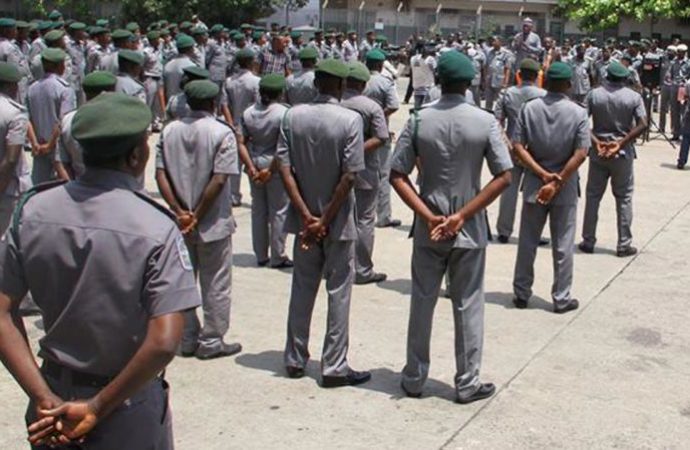Supreme Court decides suspended CJN Onnoghen’s fate May 17

A full panel of the Supreme Court on Thursday fixed May 17, 2019 to deliver judgment on the suit filed by the Cross River State Government seeking to set aside the six count charge of non-assets declaration against the suspended Chief Justice of Nigeria (CJN), Justice Walter Onnoghen.
The suit filed by the Attorney General of Cross River State on behalf of the state government, is challenging the suspension and trial of Justice Onnoghen at the Code of Conduct Tribunal (CCT).
The suit dated January 22, 2019 and marked SC/45/2019 has the Federal Republic of Nigeria (FRN) and the Attorney General of the Federation (AGF) as defendants.
But the Federal Government has asked the apex court to dismiss the suit as the plaintiff has no locus standi to institute it.
Meanwhile, when the matter came up for hearing on Thursday, counsel for the plaintiff, Locius Nwosu (SAN), adopted his brief of argument in urging the court to grant the reliefs sought by the state.
On his part, counsel to the defendants and the Solicitor-General of the Federation, Dayo Akpata, argued his notice of preliminary objection in urging the court to dismiss the suit on the ground that the plaintiff lacked the locus standi to institute the action.
In a notice of preliminary objections filed by Attorney General of the Federation and Minister of Justice, Abubakar Malami (SAN), the Federal Government further challenged the jurisdiction of the court to entertain the matter on the grounds that “there is no dispute between the defendants in this suit and the plaintiff as envisaged under section 232(1) of the 1999 constitution (as amended).
It is also the contention of the Federal Government that “the subject matter of this suit is personal to Hon. Justice Nkanu Walter Samuel Onnoghen and does not in any way affect the Cross River State government as to confer on it with the locus to institute this suit.
“The reliefs and claims made herein by the plaintiff are not for the benefit of Cross River State but personal to Hon Justice Onnoghen Nkanu Walter Samuel”.
Besides, Akpata informed the apex court that the subject matter of the suit is already before the Court of Appeal which has reserved judgment.
He submitted that the action of the Cross River State amounted to “forum shopping and an abuse of court process.”
Regardless, the plaintiff counsel, Locius Nwosu insisted that the case of his client is different from the appeal filed by Justice Onnoghen at the Court of Appeal.
“My lords, the suit is not about Justice Onnoghen but about the interpretation of the constitution.
“It is for the interpretation of the provisions of the 1999 constitution, particularly sections 4,5,6, 153(1), 158(1), Paragraph 21(b) of Part 1 of the Third Schedule of the 1999 constitution (as amended), the purported filling of the charge in charge No. CCT/ABJ/01/19 between FGN vs Hon. Justice Onnoghen Nkanu Walter Samuel before the Code of Conduct Tribunal against a Judicial officer who in this case is the Chief Justice of Nigeria, without any formal complaint having been made against him to the National Judicial Council (NJC) robbed the tribunal of jurisdiction to try the charge, and all the proceedings relating thereto are null and void, a nullity”.
After taking all the arguments for and against the suit, the seven- man constitutional Panel of Justices of the Supreme Court led by Justice Bode Rhodes Vivour accordingly adjourned the case to May 17 for judgment.
Other Justices of the panel include Justice Olukayode Ariwoola; Justice Mary Peter Odili; Justice Kudirat Kekere-Ekun; Justice Ejembi Eko; Justice Musa Dattijo Mohammed and Justice Dauda Sidi Bage.
In the originating summons, the plaintiff posed four questions for the determination of the Supreme Court among which include “Whether upon proper interpretation of the provisions of section 4,5 and 6 of the 1999 constitution of the Federal Republic of Nigeria (as amended), the constitution clearly recognises and guarantees the doctrine of separation of powers and checks and balances.








